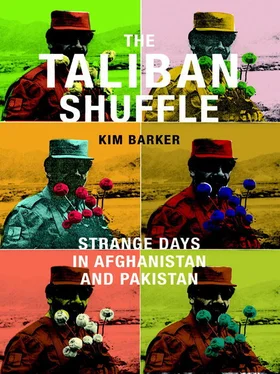I filed the information away, but considering what was happening with our company, considering how Farouq’s job was under threat, I didn’t confront my old friend about something so comparatively small. I figured everything would work out soon. I just didn’t know how.
CHAPTER 23
EYE OF THE TIGER
Iflew to London to meet my brother for Thanksgiving. But just as we stepped out of a cab to meet Sean for dinner, my phone rang. A boss.
“Where are you?” he said.
“London.”
“Damn. That’s right. I’m assuming you know about the Mumbai situation. Any thoughts?”
“What Mumbai situation?”
A situation, as I had learned, was never good.
He sighed. This was the same editor who had years earlier informed me about the tsunami—eleven hours after it hit—because I had taken the day off. He explained something about gunmen storming hotels in Mumbai in a coordinated attack.
“What?”
He told me to check the news and think about getting on a plane. My brother and I walked into a seafood restaurant to meet Sean, the first time I had seen him since our fateful lunch. We hugged, sat down, and ordered a bucket of seafood. I was distracted by Mumbai, and I kept searching the news on my BlackBerry. I knew I should head for the airport. India looked very, very bad. And I could tell who was responsible for it. Someone in Pakistan. Had to be.
But I decided I could wait until after dinner. My brother, a lawyer, asked Sean questions about every second of his kidnapping.
“Is this OK?” I asked Sean.
“It’s fine,” Sean said, and he regaled us with a story told so often it no longer seemed real.
But Sean seemed twitchy and different. He had a ten-o’clock shadow, and he kept leaving the table to smoke outside. He talked about his sons, and how guilty he felt seeing how old his parents looked when he returned from Pakistan. He hadn’t worked much since the kidnapping. He wasn’t sure what he would do in the future. He wanted to be in Mumbai. We finished dinner. My brother and I left.
“Really interesting guy,” my brother said. “I liked him. Pretty damaged, though.”
Indeed, Sean was damaged. I thought about him, and my own life. Since moving overseas, I had seen my brother for only three meals—two dinners and a breakfast. I had missed a family wedding, countless holidays. I had skipped out on helping my mother recover from the death of her husband. I had not been around for my father’s various health problems. Back home, I was the relative no one recognized. And here I was, on my first night of a short visit to my brother, thinking about flying back to Asia. What was I sacrificing everything for? I loved my job, but my job clearly did not love me. The messages from the new overall bosses featured ominous phrases such as “your partner in change” and did not mention foreign coverage. I had never even met the new editor of our newspaper. As the cherry on my sundae of doom, owner Sam Zell had just been interviewed by the editor of Portfolio magazine, in which he again complained about my story on the TV show Afghan Star . He was like my grandmother with my marital status—he wouldn’t let it go. It’s possible he thought I lived in Chicago.
“The entire focus is on becoming an international correspondent,” he complained. “I mean, I know that because our newspaper sent somebody to Kabul to cover the ‘Afghan Idol Show.’ Now, I know Idol is the No. 1 TV program in the world, but do my readers really want a firsthand report on what this broad looked like who won the ‘Afghan Idol Show’? Is that news?”
So I added up everything—my brother, Sean, Sam Zell, all that death in Mumbai. If I had learned one thing in Afghanistan and Pakistan, it was that there would always be another major tragedy. If I had learned another, it was that family was important. I had rarely put any family first, or put anything or anyone first except my job. I had lost relationships over work, friendships over work. It was time to let go.
“So you have to leave, right?” my brother asked. He knew the drill.
“I’m not going anywhere,” I said.
I called my boss.
“So is there anyone else who can go?” I asked. “I’m a little sick.”
He may have known I was exaggerating my slight sinus infection, but he definitely knew how many vacations I had cut short, how tired I was. So he said I could stay in London for a few days.
I still flew back a day early, to Islamabad. Once the horrific siege of Mumbai was finished, killing 171 people over three days, the focus of the story switched to Pakistan, hardly a shock to the world. The one surviving militant had allegedly told Indian authorities that he was from a town called Faridkot. But at least three towns were named Faridkot in the province of Punjab alone. I had no interest in running after a ghost, in driving to town after town. I wanted the right Faridkot. I also needed to go to Lahore, the capital of Punjab, to look into the charity that American and Indian authorities claimed was a front for the militant group Lashkar-e-Taiba, blamed for the Mumbai attack. This group—“Lash” for short—had been formed with the help of the Inter-Services Intelligence Directorate (ISI), the Pakistani spy agency, in the late 1980s, just after the Soviets were driven out of Afghanistan. It had originally served as an unofficial arm of the Pakistan military, doing its dirty work in the Indian-controlled part of Kashmir.
After Lash was blamed for attacking India’s parliament in late 2001, Pakistan banned the group and distanced itself—in theory, at least. Like other banned militant groups, leaders were placed under house arrest, but only for a few months. Like other groups, Lash simply changed its name. Most militancy experts and Western diplomats believed that Lash was now publicly operating as the charity Jamaat-ud-Dawa. The same man had started both groups, the groups had shared the same leaders. Even before the siege of Mumbai, the United States had imposed financial sanctions on the founder and listed both groups as terrorist organizations.
Still, despite a public crackdown on Lash, the charity had run relief camps during a major earthquake and during the internal refugee crisis. A few weeks before Mumbai, the charity held two large meetings in Punjab Province, the first since Lash was banned. Almost a million people attended each meeting. The founder talked in vague terms about jihad, a phrase that in Islam usually meant “a personal struggle against temptation” but with these groups was often code for fighting in defense of the religion, which in recent years had included striking first. Some women in attendance were so impressed with the founder’s speeches, they handed over their gold jewelry for the cause.
Now India and the West accused Lash of planning the Mumbai attack. Given the group’s historic ties to the ISI, the group had either gone rogue or someone linked to the agency had known what was happening. I needed to go to Lahore, where the main mosque for Jamaat-ud-Dawa was. And I knew, with plenty of reservations, that I needed to go to Lahore because of Nawaz Sharif. If anyone knew the right Faridkot, he would.
That Friday, Pakistan seemed to have launched its typical crackdown on the charity—in other words, lots of noise, little action. A charity billboard in the heart of Lahore proclaimed: “We can sacrifice our lives to preserve the holiness of the Prophet.” I sent my translator into the group’s mosque because I wasn’t allowed. There, flanked by three armed guards, the founder of Jamaat-ud-Dawa and Lash preached to about ten thousand men. His bluster was typical Islamic militant stuff—about sacrifice, about Eid al-Adha, the upcoming religious festival where devout Muslims would sacrifice an animal and give part of it to the poor. The holiday honored Ibrahim, or as Jews and Christians knew him, Abraham.
Читать дальше











